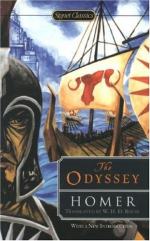So spake he, and Calypso, that fair goddess, shuddered and uttered her voice, and spake unto him winged words: ’Hard are ye gods and jealous exceeding, who ever grudge goddesses openly to mate with men, if any make a mortal her dear bed-fellow. Even so when rosy-fingered Dawn took Orion for her lover, ye gods that live at ease were jealous thereof, till chaste Artemis, of the golden throne, slew him in Ortygia with the visitation of her gentle shafts. So too when fair-tressed Demeter yielded to her love, and lay with Iasion in the thrice-ploughed fallow-field, Zeus was not long without tidings thereof, and cast at him with his white bolt and slew him. So again ye gods now grudge that a mortal man should dwell with me. Him I saved as he went all alone bestriding the keel of a bark, for that Zeus had crushed {*} and cleft his swift ship with a white bolt in the midst of the wine-dark deep. There all the rest of his good company was lost, but it came to pass that the wind bare and the wave brought him hither. And him have I loved and cherished, and I said that I would make him to know not death and age for ever. Yet forasmuch as it is no wise possible for another god to go beyond, or make void the purpose of Zeus, lord of the aegis, let him away over the unharvested seas, if the summons and the bidding be of Zeus. But I will give him no despatch, not I, for I have no ships by me with oars, nor company to bear him on his way over the broad back of the sea. Yet will I be forward to put this in his mind, and will hide nought, that all unharmed he may come to his own country.’
{* It seems very doubtful whether [Greek] can bear this meaning. The reading [Greek], ‘smote,’ preserved by the Schol. is highly probable.}
Then the messenger, the slayer of Argos, answered her: ’Yea, speed him now upon his path and have regard unto the wrath of Zeus, lest haply he be angered and bear hard on thee hereafter.’
Therewith the great slayer of Argos departed, but the lady nymph went on her way to the great-hearted Odysseus, when she had heard the message of Zeus. And there she found him sitting on the shore, and his eyes were never dry of tears, and his sweet life was ebbing away as he mourned for his return; for the nymph no more found favour in his sight. Howsoever by night he would sleep by her, as needs he must, in the hollow caves, unwilling lover by a willing lady. And in the day-time he would sit on the rocks and on the beach, straining his soul with tears, and groans, and griefs, and through his tears he would look wistfully over the unharvested deep. So standing near him that fair goddess spake to him:
’Hapless man, sorrow no more I pray thee in this isle, nor let thy good life waste away, for even now will I send thee hence with all my heart. Nay, arise and cut long beams, and fashion a wide raft with the axe, and lay deckings high thereupon, that it may bear thee over the misty deep. And I will place therein bread and water, and red wine to thy heart’s desire, to keep hunger far away. And I will put raiment upon thee, and send a fair gale in thy wake, that so thou mayest come all unharmed to thine own country, if indeed it be the good pleasure of the gods who hold wide heaven, who are stronger than I am both to will and to do.’




